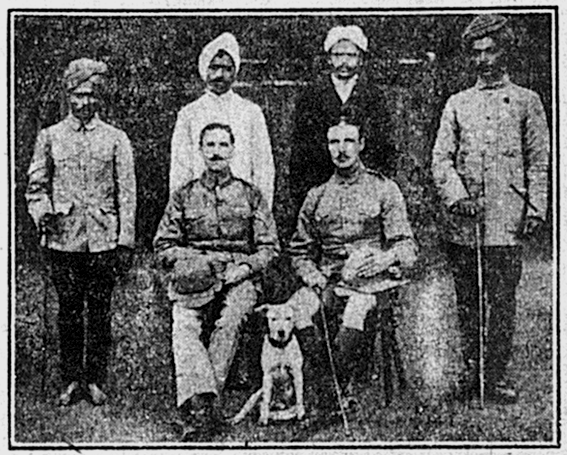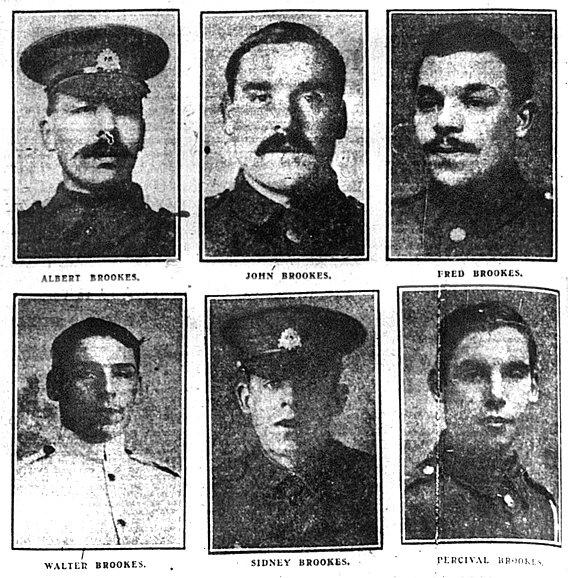
From The Luton News, April 8th, 1915.
Mr W. Stuart Caine, an assistant master at Beech Hill School until the outbreak of war,was pictured in India, serving with G Company, 4th Somerset Light Infantry, in Jullundur [Jalandar] Cantonment in the Punjab.
 In a letter to a friend in Luton Mr Caine (seated to the right) said that from exerting authority at school he was now a cog-wheel, but life in glorious India with H.M. Territorial Forces gave heaps to do. Up with the lark (or rather the vultures), obstacle courses, a shower bath, rub down, an enormous appetite, a march-out, trench-digging, musketry, bayonet exercises, and general arms drill, ceremonial inspection, a cricket or football match against the Sikh Lancers or Camel Corps, and a stroll through a native bazaar. Then a stroll back to our bungalows laden with silk curios (I fear of Brummagem origin), a sing-song, jokes, horseplay, gossip of the day, then lights out sounded by buglers.
In a letter to a friend in Luton Mr Caine (seated to the right) said that from exerting authority at school he was now a cog-wheel, but life in glorious India with H.M. Territorial Forces gave heaps to do. Up with the lark (or rather the vultures), obstacle courses, a shower bath, rub down, an enormous appetite, a march-out, trench-digging, musketry, bayonet exercises, and general arms drill, ceremonial inspection, a cricket or football match against the Sikh Lancers or Camel Corps, and a stroll through a native bazaar. Then a stroll back to our bungalows laden with silk curios (I fear of Brummagem origin), a sing-song, jokes, horseplay, gossip of the day, then lights out sounded by buglers.
The mornings and evenings were bitterly cold and they could easily see the snow-clad tops of the towering Himalayas, some 50 miles north-east.
-
Latest local recruits enlisted for the Regular Army through the Recruiting Office at the Corn Exchange: W. Ansell, H. Brown, S. Cheshire, L. W. Coleman and H. Fern.
-
Madame Strathearn, who abandoned the operatic stage 17 years ago, announced at a concert in Leighton Buzzard that her services as a vocalist at the front had been accepted in a letter from military headquarters. The well-known soprano, who was touring YMCA huts and camps around England, said: "I am very happy in this new work among the troops. I suppose it was because I was the first of my sex to go out with a military band - the 1st Life Guards."
-
With growing calls nationally for all public houses and clubs to be closed until the declaration of peace because of loss of efficiency of workers through drink, there was mixed reaction from Luton firms. One said there was no local necessity, while another said it was desirable and necessary. King George V had set an example by banning all alcohol from the Royal household until the end of the war.
-
A party of Highlanders marched through the streets of Luton with a piper at their head on Saturday evening. They were 20 members of the 6th Argyll and Sutherland Highlanders, who are training at Bedford, and came to Luton to given an entertainment at the YMCA centre at the Waller Street Plait Hall.
-
 Six sons, plus at least eight nephews and a son-in-law, were among the family of Mrs Brookes, of 75 Beech Road, Luton, who were serving in the Army. Sgt Albert Brookes, 38, the eldest son, lived with his wife and three children at 7 Hampton Road, Luton, and had served in the Beds Regiment for 12 years; Pte John Brookes, 30, was at Newmarket with the 2/5th Beds Regiment; Pte Fred Brookes, 25, in the RAMC at Woodbridge, had a wife and two children at 69 Bury Park Road; Cpl Walter Brookes, 22, was with the 1st Notts and Derby Regiment that fought at Neuve Chapelle; Pte Sidney Brookes was with the 1/5th Beds Regiment at Bury; Pte Percy Brookes, 18, was with his brother John with the 2/5th Bedfords at Newmarket. Mrs Brookes also had three older son living in Luton with their families.
Six sons, plus at least eight nephews and a son-in-law, were among the family of Mrs Brookes, of 75 Beech Road, Luton, who were serving in the Army. Sgt Albert Brookes, 38, the eldest son, lived with his wife and three children at 7 Hampton Road, Luton, and had served in the Beds Regiment for 12 years; Pte John Brookes, 30, was at Newmarket with the 2/5th Beds Regiment; Pte Fred Brookes, 25, in the RAMC at Woodbridge, had a wife and two children at 69 Bury Park Road; Cpl Walter Brookes, 22, was with the 1st Notts and Derby Regiment that fought at Neuve Chapelle; Pte Sidney Brookes was with the 1/5th Beds Regiment at Bury; Pte Percy Brookes, 18, was with his brother John with the 2/5th Bedfords at Newmarket. Mrs Brookes also had three older son living in Luton with their families. -
Last evening an alarming explosion took place at the Diamond Foundry, Dallow Road, Luton. The noise of the explosion was heard in several of the adjoining streets but no personal injuries of any kind were sustained. Moisture under a rebuilt furnace caused coke and slag to fly all over the place, some pieces smashing roof glass to fragments and other landing on the opposite side of the nearby railway line. Netting had protected about a dozen men from falling glass.
-
The Children's Guild of Kindness was hoping to beat the £271 16s 6d raised for the Children's Sick and Convalescent Home in London Road, Luton, from its annual sale of work. The event was transferred to Dunstable Road Schools as the regular venue, the Plaits Halls was in used as a recreation centre troops. At the opening by Mayoress Mrs W. J. Primett, Alderman E Oakley said an already deferred extension scheme for the Children's Home had had to be put on one side because of the war, but it was hoped it would go ahead as soon as opportunity served.
-
The Rev J. L. White, of Brixton, was to succeed the Rev G. F. Sloan as senior curate at Luton Parish Church. Mr Sloan was to become Vicar of St Simon's, West Kensington.
-
The bell installed at Round Green Mission Church was rung for the first time at an Easter Day evening service conducted by the Vicar of Stopsley.
-
The Hatters Gazette asked if Luton was about to lose its bleaching trade. It said Labour was so cheap in China that it probably would not be many years before the bleaching now done in England and Germany would be undertaken in China, and the straw hats manufactured there at a fraction of foreign costs.
-
Railway officials were kept busy in Luton over the Easter holiday. While many of the passengers were soldiers, there was still a large exodus of townsfolk, including hundreds using the Great Northern line to Dunstable and surrounding areas, and 1,700 who went to London on the Midland line over the weekend. Bedford, Harpenden and St Albans were also popular destinations.
-
South League leaders Watford gained revenge for their 2-1 defeat at home to Luton Town on Good Friday with a 2-0 win at Luton on Easter Monday in front of a crowd of nearly 10,000. Luton's closest effort came from centre forward Simms, who headed against the post.


